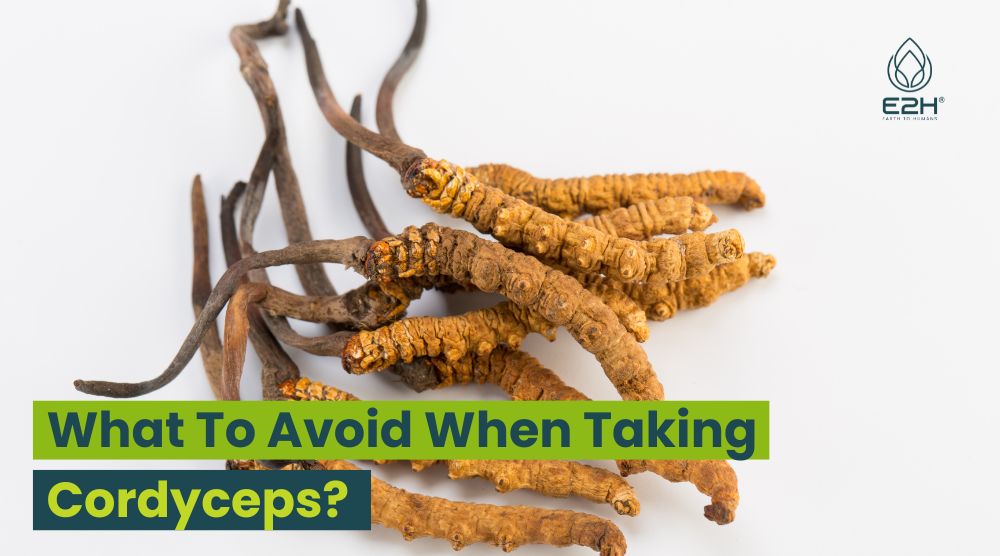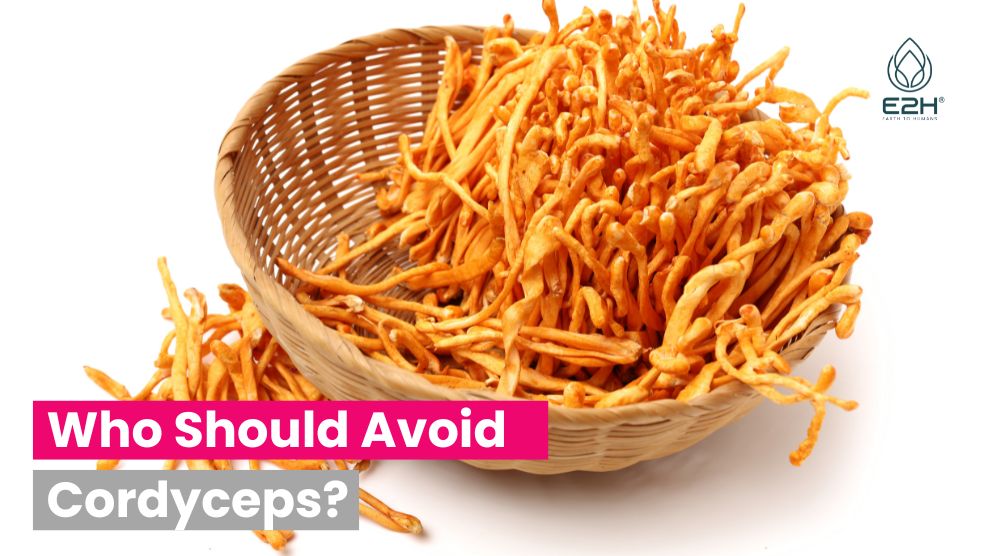Yes, while Cordyceps offers various health benefits, it can potentially cause side effects and interact with certain medications, warranting caution and consultation before use.
Ensuring your health journey is both safe and efficacious is paramount, and being armed with a holistic understanding of your supplements is a crucial step in that journey.
Join us, as we meticulously unravel the lesser-known facets of Cordyceps, ensuring your path to wellness is both enlightened and safeguarded.
What should I do if I experience adverse effects from Cordyceps?
If you experience adverse effects from Cordyceps, it’s imperative to take the following steps:
- Cease Consumption: Immediately stop taking Cordyceps to prevent further complications.
- Seek Medical Attention: Contact a healthcare professional or visit an emergency room, especially if symptoms are severe or worsening.
- Document Symptoms: Keep a record of the symptoms experienced, their onset, and duration, which can aid healthcare professionals in providing appropriate care.
- Product Information: Preserve the Cordyceps product packaging or information, as it may be useful for healthcare professionals to determine the cause and treat symptoms effectively.
- Report the Incident: Consider reporting the adverse effects to relevant health authorities or the product manufacturer to alert them to potential issues with the product.
- Review and Adjust: Once recovered, consult with a healthcare professional before resuming any supplement regimen to ensure safety and prevent recurrence of adverse effects.

Can Cordyceps interact with medications I’m currently taking?
Yes, Cordyceps can interact with certain medications, posing potential risks. Particularly, it can interact with anticoagulant and antiplatelet medications, such as warfarin and aspirin, due to its potential to slow blood clotting, thereby increasing the risk of bleeding and bruising.
Additionally, Cordyceps might lower blood sugar levels, which could amplify the effects of antihyperglycemic medications used to manage diabetes, potentially resulting in hypoglycemia.
Furthermore, since Cordyceps can stimulate the immune system, it might interfere with immunosuppressive medications. Always consult with a healthcare professional before incorporating Cordyceps into your regimen to avoid adverse interactions with your current medications.
How should I consume Cordyceps for maximum safety?
To consume Cordyceps safely, adhere to the following guidelines:
- Quality: Ensure you select a high-quality Cordyceps supplement from a reputable source to avoid contaminants.
- Dosage: Stick to recommended dosages, which can vary but studies often use 1,000–3,000 mg per day.
- Pregnancy and Breastfeeding: Avoid use during pregnancy and breastfeeding due to insufficient data on safety.
- Autoimmune Diseases: Exercise caution or avoid if you have an autoimmune disease due to its immune-stimulating effects.
- Surgery: Discontinue use several weeks before surgery to prevent excessive bleeding.
- Allergies: Be cautious if you have known allergies, especially to fungi, mold, or yeast.
Are there any known allergic reactions to Cordyceps?
Yes, there have been instances where individuals exhibit allergic reactions to Cordyceps. Some common allergic reactions might include skin rashes, difficulty breathing, tightness in the throat or chest, chest pain, and itchy or swollen skin.
If you have a known allergy to other fungi, molds, or yeasts, exercise caution as you may be more susceptible to an allergic reaction from Cordyceps. Always start with a smaller dose to observe any adverse reactions before gradually increasing it.
If you experience any signs of an allergic reaction, discontinue use of cordyceps fungi immediately and consult a healthcare professional. Remember, safety first in supplement utilization.
Can Cordyceps be harmful if taken in excessive amounts?
Indeed, while this species of Cordyceps is generally considered safe for most people, excessive intake might lead to potential issues. Overconsumption of Cordyceps could result in mild digestive issues, such as constipation, diarrhea, or stomach discomfort.
Additionally, due to its bioactive compounds like cordycepin, which have anti-inflammatory and anticancer properties, excessive amounts might interact with the body’s normal functioning or other medications being taken.
It’s imperative to adhere to recommended dosages, typically between 1,000–3,000 mg per day in studies, and always consult healthcare professionals before making any adjustments to ensure safe and effective use of Cordyceps supplements.
Are there any contraindications for specific medical conditions?
Yes, certain medical conditions warrant caution or contraindication for Cordyceps use. Individuals with bleeding disorders or those taking anticoagulant or antiplatelet medications should be cautious due to Cordyceps’ potential to slow blood clotting.
People with autoimmune diseases, such as lupus, multiple sclerosis, or rheumatoid arthritis, should also exercise caution since Cordyceps can stimulate the immune system, potentially exacerbating symptoms or interfering with immunosuppressive medications.
Moreover, due to its potential hypoglycemic effects, individuals with diabetes, especially those on antihyperglycemic medications, should monitor their blood sugar levels closely or avoid Cordyceps to prevent potential hypoglycemia.
Is it safe to give Cordyceps to children or pets?
The safety of Cordyceps for children and pets is not well-documented and thus, it is prudent to exercise caution. For children, especially, there is a lack of scientific data regarding safe dosages and potential side effects of cordyceps, making it crucial to consult a pediatrician before considering its use.
Regarding pets, there is limited information on the safety and efficacy of Cordyceps. While it might be safe for humans, the same cannot be assumed for animals due to differences in metabolism and sensitivity to substances. Always consult a veterinarian before introducing any new supplement to your pets’ diet to ensure safety and prevent unintended adverse or serious health effects.
What do scientific studies say about the safety of Cordyceps?
Scientific studies generally regard Cordyceps as safe for most individuals when consumed in appropriate amounts. Research indicates that cordyceps increase antioxidants potential health benefits, such as enhanced exercise and athletic performance, and anti-aging properties, among others.

However, certain side effects and interactions have been noted, particularly concerning its ability to slow blood clotting and potentially lower blood sugar levels. Some studies highlight caution for individuals with specific health conditions or those taking certain medications, such as anticoagulants, antiplatelets, or antihyperglycemic drugs.
While Cordyceps has been utilized in traditional medicine for centuries, more comprehensive research is needed to fully understand its safety profile across various populations and health conditions.
Can Cordyceps be contaminated with harmful substances?
Yes, like any supplement, Cordyceps can be contaminated with harmful substances if not sourced or processed correctly. Contaminants such as heavy metals, pesticides, or other toxic substances can be present, especially if cordyceps fungus grown in suboptimal conditions or handled improperly.
Additionally, due to its popularity and the high cost of wild Cordyceps, some products on the market may be adulterated with other fungi or substances to cut costs. Ensuring that you purchase Cordyceps from a reputable supplier, preferably with third-party testing for purity and potency, is crucial to help fight avoid potential contaminants and ensure you are consuming a safe, high-quality product.
How can I differentiate between genuine Cordyceps and fake products?
Differentiating genuine Cordyceps from fake or adulterated products can be challenging due to the availability of sophisticated counterfeit products. Here are some tips:
- Source: Purchase from reputable suppliers or brands known for quality and transparency.
- Third-Party Testing: Look for products that have been third-party tested for purity and potency.
- Price: Genuine Cordyceps, especially wild-harvested varieties, can be quite expensive. Be wary of prices that seem too good to be true.
- Appearance: Genuine Cordyceps should have a distinct, somewhat earthy smell and a specific appearance, which can be researched and compared.
- Reviews and Certifications: Check for reviews and any certifications that might indicate the quality and authenticity of the product.
- Ingredient List: Ensure that Cordyceps is the primary ingredient and be wary of excessive fillers or unrelated substances.
Are there any potential long-term risks associated with Cordyceps use?
The long-term risks associated with Cordyceps use are not thoroughly documented in scientific literature, warranting a cautious approach for sustained usage. While Cordyceps extract has been utilized in traditional medicine for extended periods, scientific validation of its long-term safety is limited.
Some potential risks might stem from its known short-term effects, such as its impact on blood clotting and blood sugar levels, which could potentially pose issues with prolonged use, especially for individuals with underlying health conditions.
It’s imperative to consult healthcare professionals for personalized advice, especially when considering Cordyceps for long-term supplementation, to navigate any potential risks and monitor for any adverse effects.
Are there any age restrictions for Cordyceps consumption?
Specific age restrictions for Cordyceps consumption are not universally established, but general guidelines and cautionary practices can be applied. For children, due to the lack of comprehensive research regarding safety and appropriate dosages, it is prudent to consult a pediatrician before considering its use.
Similarly, for elderly individuals, especially those with existing health conditions or on medications, a healthcare professional’s advice should be sought to ensure safe consumption. While Cordyceps is utilized across various age groups in traditional herbal medicine, ensuring its safe application across all age demographics, especially those that might be more vulnerable to its effects, is crucial to prevent potential adverse outcomes.
What are common side effects of cordyceps?
Cordyceps, while celebrated for its myriad of purported health benefits, is not without potential side effects. Commonly reported adverse effects include dry mouth, nausea, and diarrhea. Some individuals may also experience constipation and abdominal discomfort.
Furthermore, there have been instances of cordyceps causing mild skin rash, signaling a possible allergic reaction. It’s also crucial to note that cordyceps can slow blood clotting, which might pose a risk for individuals with bleeding disorders or those undergoing surgery.
Always approach cordyceps supplementation with caution and consult a healthcare professional to navigate its use safely, especially if you have underlying health conditions.
How do cordyceps supplements affect liver function?
The impact of cordyceps supplements on liver function is a topic that warrants careful consideration. Some studies suggest that cordyceps may offer hepatoprotective effects, potentially safeguarding the liver from damage and supporting its function.
However, it’s pivotal to note that while some cordyceps research indicates potential liver benefits, comprehensive data, especially regarding long-term use and its impact on liver function, is not thoroughly established.
Individuals with existing liver conditions or those taking medications that impact liver function should consult healthcare professionals before initiating cordyceps supplementation to ensure it is safe and will not adversely affect liver health and functionality.
Are there any cardiovascular concerns related to Cordyceps Sinensis?
Cordyceps Sinensis, while often hailed for potential cardiovascular benefits, does come with considerations that need to be acknowledged. It has been noted to possess antiplatelet and anticoagulant properties, which, while potentially beneficial in certain contexts, might pose risks for individuals with bleeding disorders, those taking blood-thinning medications, or individuals undergoing surgery.

Additionally, while some studies suggest potential benefits regarding lipid profiles and heart health, comprehensive research, especially in human models, is somewhat limited. Thus, while Cordyceps Sinensis might offer cardiovascular benefits, it is essential to approach certain health benefits from its use with caution and seek professional advice, particularly if you have existing cardiovascular conditions.
How does cordyceps influence blood sugar levels?
Cordyceps has demonstrated the potential to influence blood sugar levels, which is particularly pertinent for individuals with diabetes or those managing blood sugar for other health reasons. Some research indicates that cordyceps may have hypoglycemic effects, potentially lowering blood sugar levels by influencing insulin sensitivity and carbohydrate metabolism.
While this might be beneficial in certain contexts, it also poses a risk of hypoglycemia, especially for individuals taking antihyperglycemic medications, as it might amplify their effects. Always consult with a healthcare professional before incorporating cordyceps into your regimen if you are managing blood sugar levels, to ensure safe and monitored use.
FAQs For ‘Can Cordyceps Be Bad For You’
Can Cordyceps cause any side effects?
Yes, Cordyceps can cause side effects like dry mouth, nausea, and diarrhea, and may also slow blood clotting in some individuals.
Is it safe to consume Cordyceps daily?
While often used daily, it’s vital to adhere to recommended dosages and consult a healthcare professional for personalized advice on daily Cordyceps consumption.
Can Cordyceps interact negatively with any medications?
Yes, Cordyceps can interact with anticoagulant, antiplatelet, and antihyperglycemic medications, potentially amplifying their effects and causing adverse reactions.
Should individuals with autoimmune diseases consume Cordyceps?
Caution is advised for individuals with autoimmune diseases as Cordyceps can stimulate the immune system, potentially exacerbating symptoms or interfering with medications.
Is Cordyceps safe for pregnant or breastfeeding individuals?
Due to insufficient data, it is recommended that pregnant or breastfeeding individuals avoid Cordyceps to ensure safety for both mother and child.
Conclusion
In the journey toward optimal heart health, understanding the full spectrum of our chosen supplements, like Cordyceps, is paramount. While it brings to the table a host of benefits, recognizing its potential downsides and approaching its use with informed caution ensures that our wellness path is navigated safely and effectively. Always prioritize knowledge, consult professionals, and approach your wellness journey with a balanced, well-informed perspective.














